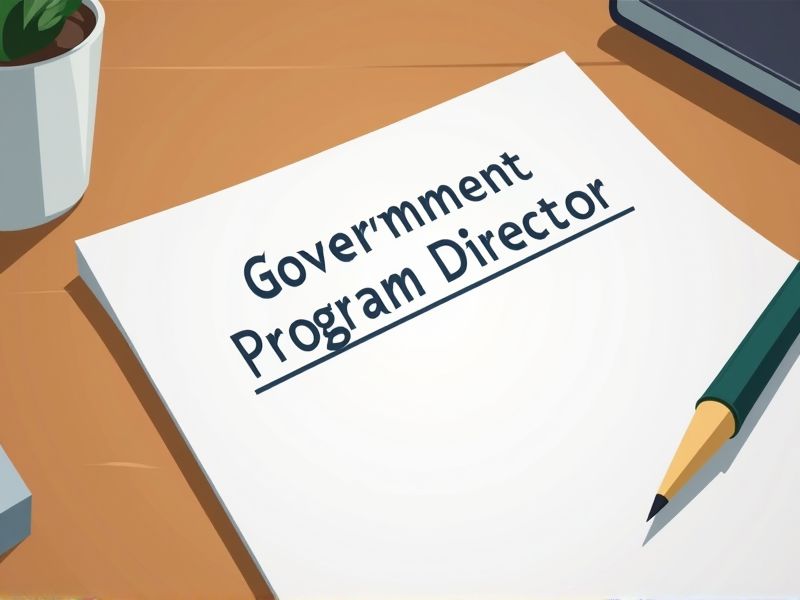
Government Program Directors oversee complex initiatives that require a deep understanding of regulatory frameworks, policy development, and project management. Certifications provide validation of expertise in these areas, enhancing a director's ability to navigate governmental procedures effectively. They establish credibility and ensure compliance with established protocols and standards. Here are some crucial certifications necessary for a Government Program Director.
Project Management Professional (PMP)
Implementing government initiatives often involves complex projects requiring skilled oversight. The PMP certification provides program directors with a standardized framework for effective project management practices. With PMP credentials, directors can ensure projects align with strategic objectives, manage resources efficiently, and mitigate risks. An organization benefits from improved project success rates and enhanced accountability when led by a PMP-certified professional as it can avail agile methodologies and data-driven decision-making.
Program Management Professional (PgMP)
The complexity of government programs demands a structured approach, which the Program Management Professional (PgMP) certification provides. PgMP equips directors with advanced skills in strategic program management, enhancing the efficiency and effectiveness of project execution. Government initiatives often involve multiple stakeholders; PgMP training aids in fostering collaboration and communication among them. Compliance and risk management are critical in government projects, and PgMP certification ensures directors have the tools to address these challenges effectively.
Certified Public Manager (CPM)
Certified Public Manager (CPM) enhances leadership skills, which directly affects the performance of a Government Program Director by improving decision-making capabilities. CPM training provides a structured approach to problem-solving, leading to more efficient management of resources and projects in government settings. The certification instills a comprehensive understanding of governmental processes, resulting in more streamlined operations and policy implementation. A Government Program Director with CPM credentials can contribute to enhanced accountability and transparency, fostering public trust in government initiatives.
ITIL Foundation Certification
The ITIL Foundation Certification imparts a comprehensive understanding of IT service management principles, crucial for a Government Program Director overseeing technology-driven service improvements. By adopting ITIL practices, the director can enhance service efficiency and ensure alignment with organizational strategies, leading to streamlined government operations. The certification provides a structured approach to incident and change management, minimizing disruptions in essential public services. Adopting ITIL's standardized processes fosters transparency and accountability, essential qualities for effective governmental program management.
Lean Six Sigma Black Belt Certification
A Lean Six Sigma Black Belt Certification equips a Government Program Director with advanced skills in process optimization, increasing efficiency in public sector projects. It provides the necessary analytical tools to identify and eliminate waste, leading to cost savings for government operations. The certification enhances decision-making capabilities by fostering a culture of data-driven strategies among teams. As program complexity increases, the certification ensures improved quality and consistent delivery of services to the public.
PMI Risk Management Professional (PMI-RMP)
The complexity of government programs often involves numerous uncertainties, making risk management crucial; obtaining the PMI Risk Management Professional (PMI-RMP) certification equips a Program Director with advanced risk assessment skills essential for navigating these challenges. As public-sector projects demand accountability and transparency, a PMI-RMP credential ensures the implementation of robust risk controls, thereby enhancing stakeholder confidence. Government programs operate under strict budgetary constraints, and effective risk management directly influences cost-saving measures; a certified PMI-RMP can adeptly prioritize resources to mitigate financial risks. This certification signals a commitment to adhering to global risk management standards, aligning government projects with best practices and increasing their chances of successful execution.
Certified Information Systems Security Professional (CISSP)
Becoming a Certified Information Systems Security Professional (CISSP) ensures the Government Program Director possesses recognized expertise in information security, crucial for protecting sensitive government data. Possessing a CISSP certification demonstrates a solid understanding of risk management, essential for making informed decisions about resource allocation and threat mitigation in governmental contexts. The certification establishes credibility and trust with stakeholders who demand proven competencies in handling complex security challenges. CISSP's comprehensive framework equips directors with the necessary skills to adhere to national and international security standards, aligning government projects with legal and regulatory requirements.
Defense Acquisition Workforce Improvement Act (DAWIA) Level III Certification
The DAWIA Level III Certification signals a high level of expertise and competence, which is crucial for a Government Program Director to effectively manage large-scale defense projects. Without this certification, a program director might lack the specialized knowledge required to navigate complex procurement regulations and processes, potentially leading to inefficiencies and increased costs. Regulatory compliance is a critical requirement in defense acquisitions, and the Level III Certification ensures that directors are well-versed in necessary legal and policy frameworks. In the absence of this certification, project mismanagement might result, affecting mission readiness and national security objectives.
Certified Business Analysis Professional (CBAP)
The CBAP provides Government Program Directors with advanced skills in analyzing complex business needs, which helps enhance decision-making. It equips them with a recognized standard of expertise, ensuring adherence to globally accepted business practices. With CBAP certification, these directors can better align government programs with strategic objectives, improving program outcomes. It fosters a deeper understanding of stakeholder requirements, leading to more efficient resource allocation and project execution.
Prosci Change Management Certification
Prosci Change Management Certification provides Government Program Directors with structured methodologies to manage and implement change efficiently. Without this certification, potential misalignments in communication and stakeholder engagement can arise, which hinders program success. Having this expertise allows directors to identify and mitigate resistance, promoting smoother transitions during major governmental shifts. Certified directors are better equipped to deliver programs on time and within budget, enhancing public trust and credibility.
Summary
Acquiring certifications can enhance your credibility as a Government Program Director, leading to increased trust from stakeholders. Certifications often arm you with updated management practices, potentially improving project outcomes. You are also likely to witness enhanced team collaboration, given the modern techniques that come with accredited learning. The combined effect of these certifications can often bolster the efficiency and transparency of government projects.
